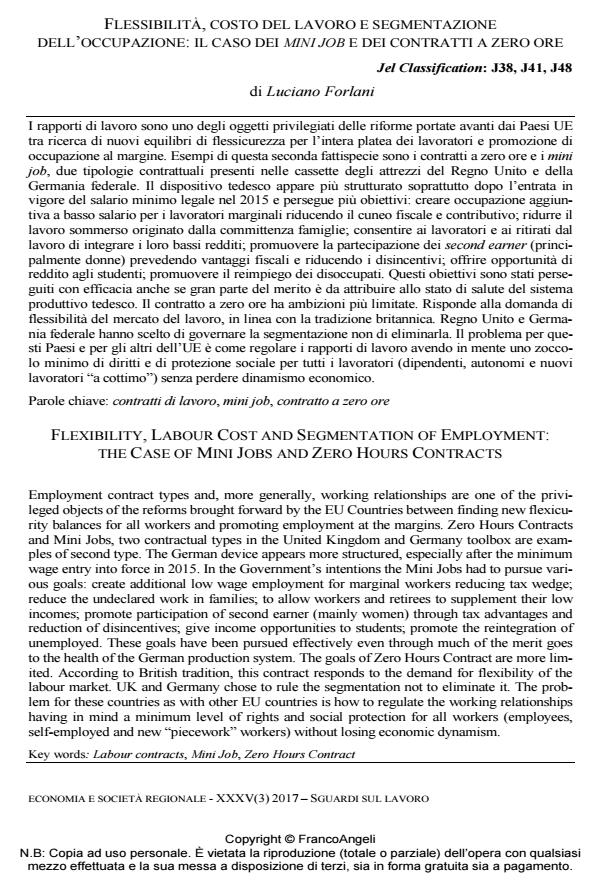Flexibility, labour cost and segmentation of employment: the case of mini jobs and zero hours contracts
Journal title ECONOMIA E SOCIETÀ REGIONALE
Author/s Luciano Forlani
Publishing Year 2018 Issue 2017/3
Language Italian Pages 19 P. 8-26 File size 381 KB
DOI 10.3280/ES2017-003002
DOI is like a bar code for intellectual property: to have more infomation
click here
Below, you can see the article first page
If you want to buy this article in PDF format, you can do it, following the instructions to buy download credits

FrancoAngeli is member of Publishers International Linking Association, Inc (PILA), a not-for-profit association which run the CrossRef service enabling links to and from online scholarly content.
Employment contract types and, more generally, working relationships are one of the privileged objects of the reforms brought forward by the EU Countries between finding new flexicurity balances for all workers and promoting employment at the margins. Zero Hours Contracts and Mini Jobs, two contractual types in the United Kingdom and Germany toolbox are examples of second type. The German device appears more structured, especially after the minimum wage entry into force in 2015. In the Government’s intentions the Mini Jobs had to pursue various goals: create additional low wage employment for marginal workers reducing tax wedge; reduce the undeclared work in families; to allow workers and retirees to supplement their low incomes; promote participation of second earner (mainly women) through tax advantages and reduction of disincentives; give income opportunities to students; promote the reintegration of unemployed. These goals have been pursued effectively even through much of the merit goes to the health of the German production system. The goals of Zero Hours Contract are more limited. According to British tradition, this contract responds to the demand for flexibility of the labour market. UK and Germany chose to rule the segmentation not to eliminate it. The problem for these countries as with other EU countries is how to regulate the working relationships having in mind a minimum level of rights and social protection for all workers (employees, self-employed and new "piecework" workers) without losing economic dynamism.
Keywords: Labour contracts, Mini Job, Zero Hours Contract
Jel codes: J38, J41, J48
- Autor D.H., Dorn D. (2013). The Growth of low skills service jobs and the polarization of the US Labour Market. American Economic Review, 5/; 103(5): 1553-1597,
- Autor D.H., Levy F., Murname R.J. (2003). The Skill Content of Recent Technological Change: An Empirical Exploration. Quarterly Journal of economics, 118(4): 1279-1333, DOI: 10.1162/003355303322552801
- Autor D.H., Price B. (2013). The Changing Task Composition of the US Labour Market. MIT WP, -- <https://economics.mit.edu/files/11600>.
- Chartered Institute Personnel and Development – CIPD (2017). To Gig or not to Gig? Stories from the Modern Economy. Survey Report, March, -- <https://www.cipd.co.uk/Images/to-gig-or-not-to-gig_2017-stories-fromthe-modern-economy_tcm18-18955.pdf>.
- Eurofound (2015). New Forms of Employment. Research Report, -- <https://www.eurofound.europa.eu/it/publications/report/2015/working-conditions-labour-market/new-forms-of-employment> DOI: 10.2806/989252
- Eurofound (2017). Aspects of Non-Standard Employment in Europe, -- <https://www.eurofound.europa.eu/sites/default/files/ef_publication/field_ef_document/ef1724en.pdf>.
- Eurofound (2017). Exploring self-employment in the European Union, -- <https://www.eurofound.europa.eu/publications/report/2017/exploring-selfemployment-in-the-european-union>, DOI: 10.2806/65191
- Grimshaw D., Johnson M., Keizer A., Rubery J. (2017). The Governance of Employment Protection in the UK: How the state and Employers are Undermining Decent Standards. In: Piasna A., Myant, eds. Myths of Employment Deregulation: How it Neither Creates Jobs nor Reduces Labour Market
- Segmentation. Brussels: Etui, Chap. 11: 225-245, -- <https://www.etui.org/content/.../17+Piasna+Myant+Employment+deregulation+WEB.pdf.>.
- House of Commons UK (2016). by Rhodes Ch. Business Statistics. Library Briefing Paper, Number 06152, 23 November 2016, -- <http://researchbriefings.parliament.uk/ResearchBriefing/Summary/SN06152#fullreport>.
- Jaehrling K. (2017). The Atypical and Gendered ‘Employment Miracle’ in Germany: a Result of Employment Protection Reforms or Long-term Structural Changes? In: Piasna A., Myant, eds. Myths of Employment Deregulation: How it Neither Creates Jobs nor Reduces Labour Market Segmentation.
- Brussels: Etui, Chap. 8: 165-184, -- <https://www.etui.org/content/17+Piasna+Myant+Employment+deregulation+WEB.pdf.>
- Lang C., Schomann I., Clauwaert S. (2013). Atypical Forms of Employment Contracts in Times of Crisis. Working Papers, 3. Brussels: ETUI, -- <https://www.etui.org/Publications2/Working-Papers/Atypical-forms-ofemployment-contracts-in-times-of-crisis>.
- Marzano G. (2016). Intelligenza artificiale e mercato del lavoro: il recente dibattito americano. Economia & lavoro, 2: 159-180, DOI: 10.7384/84409
- Matsaganis M., Özdemir E., Ward T., Zavakou A. (2016). Non Standard Employment and Access to Social Security Benefits. EU, Research Note 8/2015, -- <ec.europa.eu/social/BlobServlet?docId=15687&langId=en>.
- Muro M. (2016). The GIG Economy: Complement or Cannibal. Brookings the Metropolitan Policy Program, 17 November, -- <https://www.brookings.edu/blog/the-avenue/2016/11/17/the-gig-economy-complement-or-cannibal/>.
- Muro M., Liu S., Whiton J., Kulkarni S. (2016). Digitalization and the American workforce. Brookings the Metropolitan Policy Program, 15 November, -- <https://www.brookings.edu/wp-content/uploads/2017/11/mpp_2017nov15_digitalization_full_report.pdf>.
- Oecd (2014). Germany: Keeping the Edge Competitiveness for Inclusive Growth. Better Policies Series, 10 February. Paris: Oecd Publishing,
- Ons - Office for National Statistics (2017). People in Employment on a Zero-Hours Contract, -- <www.ons.gov.uk/employmentandlabourmarket/peoplein work/earningsandworkinghours/articles/contractsthatdonotguaranteeaminimumnumberofhours/mar2017#annex-1-measures-of-uncertainty>.
- Taylor M. Commission (2017). Good Work. The Taylor Review of Modern Working Practices.. Published From: Department for Business, Energy & Industrial Strategy. Part of: Employment, 11, -- <https://www.gov.uk/government/uploads/system/uploads/attachment_data/file/627671/good-work-taylorreview-modern-working-practices-rg.pdf>.
- World Economic Forum (2016). The Future of the Jobs. Employment, Skills, and Workforce Strategy for the Fourth Industrial Revolution. January, -- <http://www3.weforum.org/docs/WEF_Future_of_Jobs.pdf>.
Luciano Forlani, Flessibilità, costo del lavoro e segmentazione dell’occupazione: il caso dei mini job e dei contratti a zero ore in "ECONOMIA E SOCIETÀ REGIONALE " 3/2017, pp 8-26, DOI: 10.3280/ES2017-003002